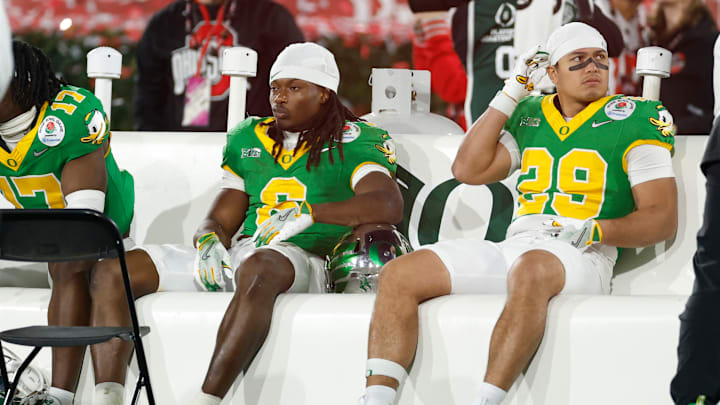We are one game away from the national quarterfinals of the College Football Playoff being over with and done. As many people expected, Arizona State and Boise State were not as deep as their Texas and Penn State counterparts. While some could have foreseen Ohio State getting the best of Oregon in the rematch from the regular season in the Rose Bowl, the under-seeded teams have all moved on.
Admittedly, we still have one conference champion still left in the tournament in Georgia out of the SEC, but they have to go up against a juggernaut team that does not even play in a conference in Notre Dame with a backup quarterback. That game could go either way in New Orleans on Thursday evening. Regardless, perhaps the first-round byes have contributed to the losing team's slow starts?
Boise State trailed Penn State 14-0 before eventually making a game of it in the Fiesta Bowl in New Year's Eve. Arizona State did force overtime in the Peach Bowl, but a 14-3 start and a rough first quarter contributed to Texas hooking the Sun Devils. As for what happened in the Rose Bowl between Oregon and Ohio State, the Ducks curled up into a ball facing a 17-0 deficit after getting pummeled.
I have another theory as to why this has happened, but opening deficits may be a result of the bye.
Opening deficits for CFP teams with a bye:
— Hunter Johnson (@UnterHonson) January 1, 2025
14-0
14-3
17-0
Not sure 3-4 week byes are as good as they sound…
There is some correlation, but not enough causation for me. I think it has more to do with coaching...
College Football Playoff bye team deficits are a new flaw in the system
We have seen championship-caliber teams come out flat off a bye in the NFL for decades. It has become a too-common trend in MLB's recently expanded format. There are various reasons why this happens. For the NFL, the team with the top seeds usually a resting starters ahead of a meaningless final game of the regular season. In short, their best players do not play for weeks and it compounds.
In baseball, having a first-round bye can be problematic in sport defined by routine, superstition and the sheer slog of it all playing six days a week for six months straight. Too much rest gets in the heads of the more talented team's players. I do not know how you solve that other than adding two more teams to the postseason in both leagues. That would have to come with expansion and realignment.
Now ... back to my point about coaching. It seems to me that the teams with the more experienced head coach, particularly ones who have coache in the playoff always had the upper hand. Kenny Dillingham and Spencer Danielson were always at a talent disadvantage, but they did make it a bit more respectable going up against the veteran Steve Sarkisian and James Franklin, respectively.
As far as Dan Lanning goes, Ryan Day may not be the most liked head coach in college football, but he has been in his post twice as long as Lanning has. Furthermore, this is his fourth trip to the College Football Playoff and he just coached in his sixth playoff game. His seventh one is coming up against Sarkisian in his third. Lanning had not led Oregon to the playoff prior to this season. Let that sink in.
I do not know if it like players and coaches being in their first Super Bowl, but they tend to black out in the moment in the magnitude of it all for just a little bit. My biggest takeaway from the entire season is that coaching matters. An addendum to that is big-game experience, good or bad, is to the benefit of the coach who has been in a similar situation before at his current post. It is not untrodden territory...
Byes may be feeding into the narrative, but not knowing how to prepare is more than half the battle.
